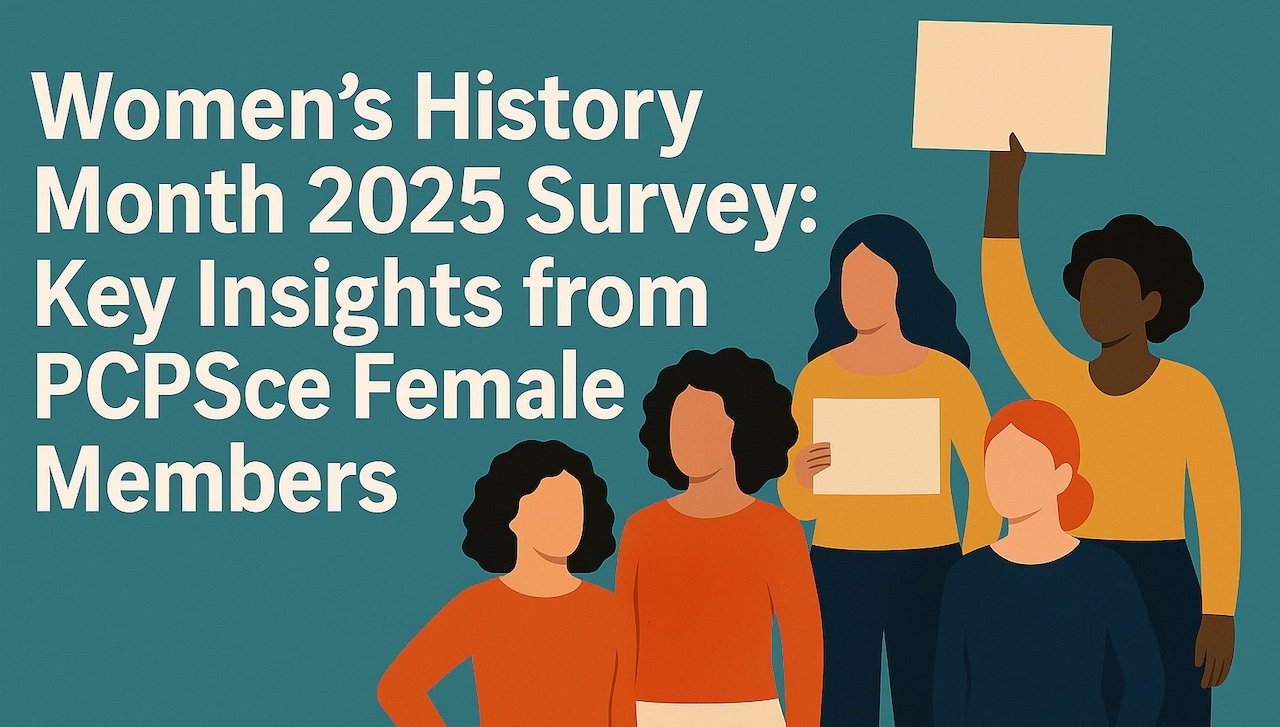Summary
This post shares key insights from a 2025 survey of women in the PCPSce network. Of 66 invited, 25 completed the survey. Participants reflected on gender representation in research, challenges faced in academic careers, and advice for younger scholars. The responses highlight persistent structural barriers and the need for continued attention to gender equity in academic contexts.
Reflections from the 2025 Women’s History Month Survey
In March 2025, to mark Women’s History Month, the Science Communication Team of the COST Action Print Culture and Public Spheres in Central Europe (1500–1800) (PCPSce) launched a voluntary and anonymous survey addressed to all female members of the Action. The aim was to gather qualitative insights into how women within the network perceive their scholarly fields, experience their professional trajectories, and envision academic life for the next generation.
At the time of the survey, the Action counted 134 members, of whom 66 were women.[1] The questionnaire was distributed to all 66 women. In total, 38 responses were submitted. 25 responses were completed with answers to the questions posed.
Survey Structure and Guiding Questions
Participants were invited to respond to the following three open-ended questions:
- Do you think that women in history are represented sufficiently in the literature of your field of research? Feel free to elaborate and/or give examples.
- Do you feel that you have ever faced challenges in your career because you are a woman? Feel free to elaborate and/or give examples.
- What advice would you give to young women starting a career in academia today?
On the Representation of Women in Research
A clear majority of respondents expressed concern regarding the continued underrepresentation of women in their fields. Several noted that even when women are included in scholarly narratives, they are often positioned as secondary figures, or their work is cited without due recognition. In fields closely related to the Action’s focus—such as book history, printing, and the circulation of knowledge—women’s roles remain insufficiently acknowledged. As one participant wrote, “the input of a woman goes into the footnotes of an article,” while the conclusions are often attributed to male colleagues.
Others pointed out that when women are represented, it is often in a limited or tokenistic way, or framed through male-centric methodologies. As one respondent put it: “Many studies continue to view women as an entirely separate category to be studied in isolation or in relation to a male-centered analysis… it baffles me that this approach persists.”
At the same time, a few voices offered more optimistic assessments, noting recent improvements or highlighting specific fields—such as cultural anthropology or gender-focused areas—where women have gained more visibility. However, even within these domains, questions remain about access to senior academic positions and structural recognition. The general consensus was that much remains to be done to fully integrate women’s contributions into the core of academic discourse.
On Gendered Challenges in Academic Careers
The second question gave rise to numerous detailed testimonies regarding the obstacles women encounter in academia. From explicit bias to subtle microaggressions, many participants shared experiences of inequality. Some examples included:
- being asked about family plans during job interviews;
- having professional achievements overlooked;
- being discouraged from pursuing “niche” (i.e., women-centered) research topics;
- facing expectations to balance caregiving with academic productivity—sometimes with severe professional penalties.
- receiving inappropriate remarks or sexualised comments in professional settings;
- encountering biased promotion practices or being excluded from key professional networks and decision-making spaces.
Several women emphasized how motherhood can exacerbate these challenges. One respondent recalled being fired for refusing overtime while caring for small children; another described being removed from a conference program just one week after giving birth, without prior notice. Others reflected on how women are often expected to work harder than their male peers to receive the same level of recognition.
Importantly, even among those who did not report personal experiences of discrimination, many observed that structural inequalities continue to affect their female colleagues and the status of women-related research topics.
Advice to Emerging Women Scholars
Despite the challenges, the tone of the advice given to young women in the final section of the survey was overwhelmingly constructive and encouraging. Several key messages emerged:
- Cultivate solidarity: “Support each other and show women’s solidarity, especially at the decision-making level.”
- Define your own path: “Establish your own criteria, practices, routines, and goals in academic life.”
- Don’t give up: “Be strong. Be bold. Never give up. The satisfaction when you reach your goal stands second to nothing.”
- Know your worth: “Never underestimate your worth or downplay your achievements.”
Conclusion
While this internal survey does not claim statistical representativity, the contributions it gathered illuminate significant patterns and lived realities within our scholarly community. The reflections offered serve as a meaningful step toward fostering dialogue, raising awareness, and promoting a more inclusive academic culture within the framework of PCPSce.
We thank all the women who shared their stories and reflections. We welcome further engagement from members interested in contributing to this ongoing conversation.
[1] Since the time of the survey, PCPSce has grown to 180 members, including 90 women (stand: October 2025).





